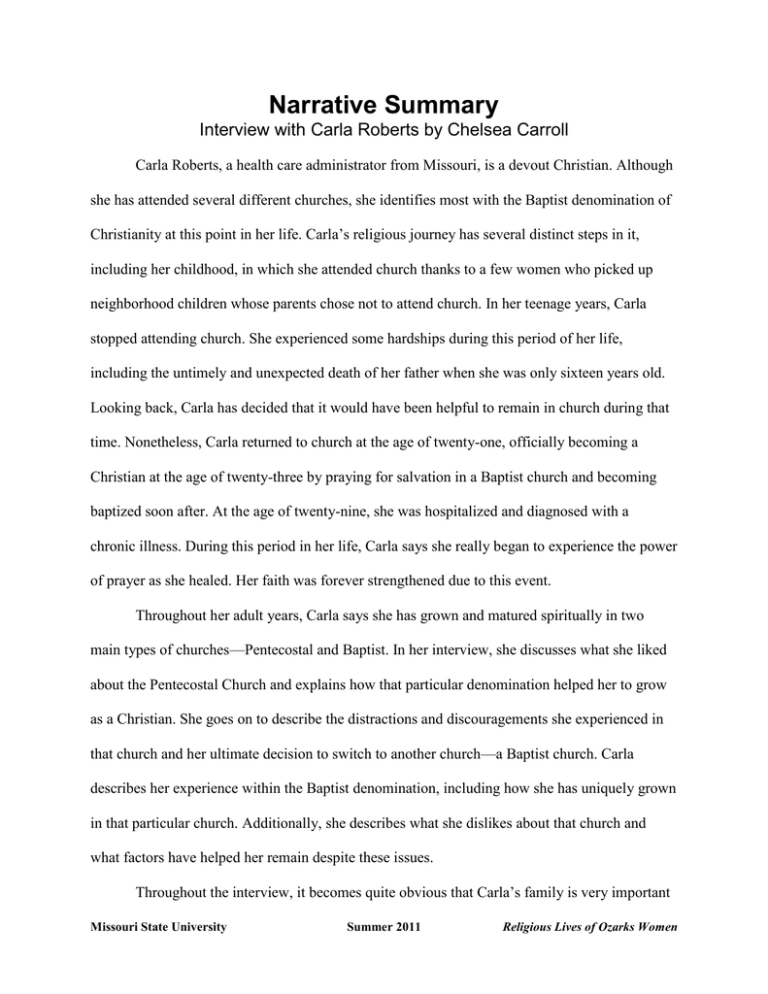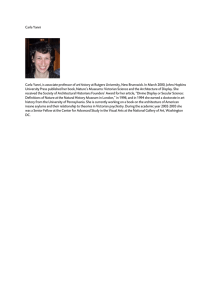Narrative Summary Interview with Carla Roberts by Chelsea Carroll
advertisement

Narrative Summary Interview with Carla Roberts by Chelsea Carroll Carla Roberts, a health care administrator from Missouri, is a devout Christian. Although she has attended several different churches, she identifies most with the Baptist denomination of Christianity at this point in her life. Carla’s religious journey has several distinct steps in it, including her childhood, in which she attended church thanks to a few women who picked up neighborhood children whose parents chose not to attend church. In her teenage years, Carla stopped attending church. She experienced some hardships during this period of her life, including the untimely and unexpected death of her father when she was only sixteen years old. Looking back, Carla has decided that it would have been helpful to remain in church during that time. Nonetheless, Carla returned to church at the age of twenty-one, officially becoming a Christian at the age of twenty-three by praying for salvation in a Baptist church and becoming baptized soon after. At the age of twenty-nine, she was hospitalized and diagnosed with a chronic illness. During this period in her life, Carla says she really began to experience the power of prayer as she healed. Her faith was forever strengthened due to this event. Throughout her adult years, Carla says she has grown and matured spiritually in two main types of churches—Pentecostal and Baptist. In her interview, she discusses what she liked about the Pentecostal Church and explains how that particular denomination helped her to grow as a Christian. She goes on to describe the distractions and discouragements she experienced in that church and her ultimate decision to switch to another church—a Baptist church. Carla describes her experience within the Baptist denomination, including how she has uniquely grown in that particular church. Additionally, she describes what she dislikes about that church and what factors have helped her remain despite these issues. Throughout the interview, it becomes quite obvious that Carla’s family is very important Missouri State University Summer 2011 Religious Lives of Ozarks Women 2 to her. She speaks a lot about her daughters and husband, describing their salvation events and baptisms as very important religious events in her life. Carla holds the unique perspective of a woman who, believing that a man should be the spiritual head of the household, was faced with the responsibility of being the sole spiritual role model for her daughters. Carla explains that she feels she has succeeded, for the most part, in instilling important Christian morals and ethics into her daughters. Regarding the topic of women in Christianity, Carla says she does not have a strong opinion concerning women in authoritative roles. In most of the churches Carla has attended, she says that women were never pastors. In fact, the current church she attends now speaks directly against female pastors. However, the same church has a board that is responsible for administrative tasks and other leadership roles within the church, and there are women who are a very active part of it. Also, women are frequently Sunday school teachers. In fact, Carla herself has quite a bit of experience in teaching the Sunday school class she has been involved in for the past several years. She says these freedoms are very positive for women, but she thinks that as long as what’s being preached is led by God and coming from his Word, it shouldn’t matter what the gender of the pastor is. In the interview, Carla explains the frequency of her everyday encounters with religion and spirituality. In her job as the executive director of a hospice program, Carla says that there isn’t a day that goes by without a discussion of spirituality, whether it is a large part or only a small part of her day. She explains that ninety-eight percent of the people being taken care of by her hospice program are in the end stages of their life. Because of that, discussions of spirituality and what it means or does not mean to the patients, pop up frequently between Carla and the company’s chaplain. Carla feels quite confident that her job is the reason that she feels immersed Missouri State University Fall 2011 Religious Lives of Ozarks Women 3 in religion on a daily basis. She makes very important distinctions in many areas throughout the interview. She distinguishes between religion and spirituality, saying she feels religion is, more or less, political. She says that sometimes people can get too caught up with the political aspects and rules surrounding a religion, losing focus on the one-on-one relationship with God. She points out that religion can be a good thing, and that she obviously has no disrespect for religion, but that she certainly feels much more spiritual than religious. When asked what advice she would like to provide regarding religion and/or spirituality, Carla replied, “I would probably say don’t get too religious [. . . .] I’m much, much, much more interested in my individual relationship with Christ.” Carla has been through many different stages in her religious life. What has remained the same is that she has always identified with Christianity, and her lifelong experience with it has caused her faith to grow and mature in unique ways at each stage of her life. She provides an important perspective about basic Christian beliefs, and is also representative of the differences in Christianity. More than anything, Carla’s story is representative of the diversity that can be found within Christianity, and her story is invaluable to the Religious Lives of Ozarks Women Archives. Missouri State University Fall 2011 Religious Lives of Ozarks Women


